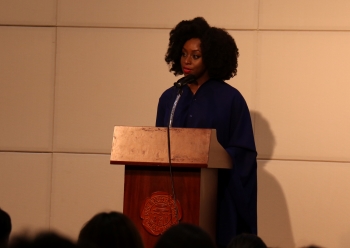
Chimamanda Ngozi Adichie visited Ewha in order to commemorate the publication of “Purple Hibiscus” in Korea. On Aug. 20, Adichie delivered a special lecture at the International Education Building followed by a Q&A session and a book signing event.
Chimamanda Ngozi Adichie is a Nigerian novelist famous for her books, essays, and lectures. Her famous TED talk, “We should all be feminists.” initiated a worldwide conversation on feminism and was published as a book.
Professor Kim Min-jung from the Department of English Language and Literature briefly introduced Adichie by mentioning her alma mater and explaining the awards received for Adichie’s novels “Purple Hibiscus,” “Half of a Yellow Sun,” “Americanah,” and “The Thing Around Your Neck.”
“Her rendering of characters in all her complexity in nuance and her fictions of Nigeria and the African continent reflects the diversity of rich texture that contributed significantly transforming readers to understand about different culture and literature all around the world,” Kim added on about Adichie’s style of writing.
Following Professor Kim’s welcoming introduction, Adichie expressed how honored she felt to be invited to Ewha.
“I feel like I’m standing in the great and glimmering shadow of Yu Gwan-sun,” Adichie said. “I’m also really happy to be here in one of the world’s oldest women’s universities, one that is an actual university for women rather than an institution that set out options of what is considered women’s subject.”
After emphasizing the importance of Ewha’s existence, Adichie started to introduce herself as a successful female leader, writer, and a feminist.
“My name is Chimamanda Ngozi Adichie,” Adichie began. “Even that, saying my name is Chimamanda Ngozi Adichie, is a feminist statement. I’ll tell you why.”
She explained that this is because she didn’t change her last name after getting married, which led to criticism of her being arrogant and disrespectful to her husband.
However, the reason she kept her name was because she liked her name. Taking a new identity and changing to someone else’s name just because of marriage did not make sense to Adichie.
Adichie also explained her journey as a writer. As a child, Adichie read British children books which gave her pleasure and comfort. The books were wonderful and fascinating, and in a developing country where she grew up, Nigeria, reading about picnics and people talking about the weather seemed unique.
Her world of literature expanded as she grew up. By reading more diverse genres of books, she realized that even ordinary experiences can be an inspiration for her writing. For example, “Purple Hibiscus” was written when Adichie moved to the United States and felt homesick. She filled the book with what she yearned for in her hometown and about the religion she had believed in since she was young. “Half of a Yellow Sun” was written about the Nigerian Civil War that deeply affected her family, and “Americanah” was written after facing situations where her black skin color meant something in the United States.
As Adichie started to speak up as a feminist novelist, Nigerians started considering her as a controversial figure who hated men.
“I don’t hate men,” Adichie said. “I love men; I love women; I love people. It’s not about hating men. It’s about pointing out the ways in which women are oppressed because they are women and the ways in which men are privileged because they are men.”
Adichie became a feminist because of the anger she felt for women having to cook, clean, dress, and make way for their husbands. She claims that she was a feminist even before knowing the word.
“I think anybody who is honest, observant to the world, and believes in justice has to be a feminist,” Adichie remarked and received fervent response from the audience. “To be honest, if you observe the world, you cannot help but acknowledge that women have been historically excluded, thrashed, and repressed. We should change that.”

